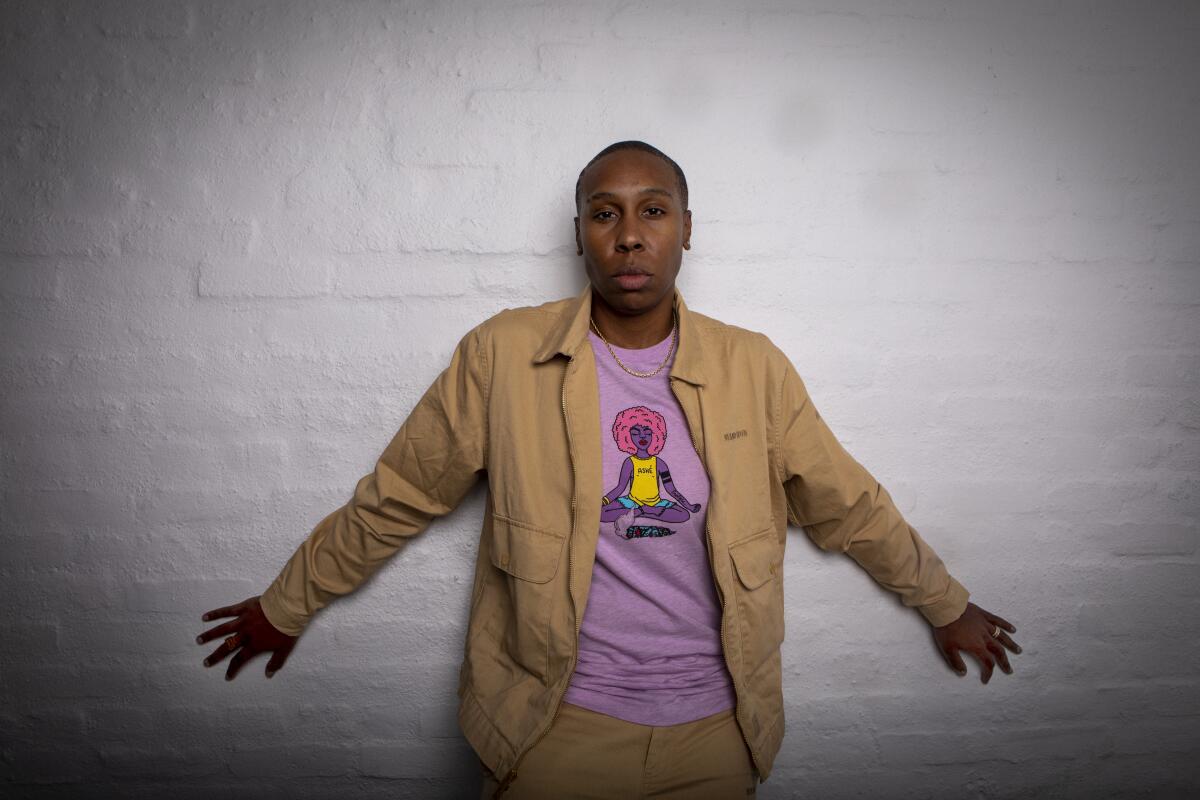Why Lena Waithe fell in love with her leads while writing ‘Queen & Slim’

“Queen & Slim” began at a party, celebrating my wife Alana Mayo. She had just been chosen as one of the Hollywood Reporter’s 35 under 35 execs. I was there gallivanting and having a good time when writer James Frey walked up to me and introduced himself.
It was kind of funny, because I knew who he was, but I joined in the formalities anyway and introduced myself as well. I think he was aware I was a writer — but at that time “The Chi” hadn’t aired yet (we were still writing the first season) and the “Thanksgiving” episode of “Master of None” was an idea that had not yet entered my mind. I say all this to say: He had no real reason to throw an idea — an idea that would ultimately change the course of my life — into my lap at a rooftop party in Hollywood.
He simply said, “I have an idea for a movie I can’t write.” I responded, “What’s the idea?” And he said, very cavalierly, a black man and a black woman go out on a first date and on their way home they get pulled over by a cop, things escalate quickly and they kill the cop in self-defense and rather than turning themselves in, they decide to get in the car and go.”
I quickly said to him, “You’re right, you can’t write that.” But I knew I could.
He had another title and an outline in his back pocket, but I didn’t want it. I didn’t need it. That sentence was all I needed to go create a black odyssey that would ultimately become a meditation on blackness and what it truly looks like to search for freedom and joy that’s everlasting.
I knew the black community and the police have had a fraught relationship since the beginning of time and if two black people killed a cop, even if it was in self-defense, it would start a media frenzy. Right away, I could see some black people cheering for them while others would be angry — assuming it could start a race war.
Then my wheels started spinning even more — what if the two leads were polar opposites. What if one was modeled after Malcolm X and the other was modeled after Martin Luther King Jr. and by the end of the journey they will have swapped places.
I could see so much possibility on my own that I told James I could take it from here — and he took no issue with that. And thus my writing journey began.
Since this would be a road trip movie, the first thing I did was print out a large map. Then I started figuring out who these characters were. I didn’t want to give too much exposition up top. I wanted the audience to get to know them at the same pace the characters got to know each other.
I also didn’t want a sympathetic cop I had to keep cutting away to. I didn’t want someone that was there to track time, and remind the audience our two leads were in trouble. We already know they’re in trouble. That’s a given. I wanted to force the audience to stay with them. You’re stuck in that car too. I wanted the audience to experience the film rather than just watch it passively.
Because I got my start in comedy, I also didn’t want to suppress my sense of humor. I felt like the film should have comical moments, because we as a community are always searching for light even in the midst of our darkest hour. So my goal was to keep the audience on the edge of their seat while tickling their funny bone every now and then. Which to me feels a lot like life.
Midway through the writing process I quickly learned why “Thelma & Louise” has the Harvey Keitel character. It’s not the worst thing in the world to have someone else to cut away to.
‘Queen & Slim,’ ‘Two Popes,’ ‘The Lighthouse’: The two-hander is strong in the awards conversation this season, showcasing actors’ intimate character work.
I was starting to feel claustrophobic in that car with Queen and Slim, but after I got past the midpoint, I didn’t mind being stuck with them. I had fallen in love with this mismatched pair, and by the time I made it to the end of the script, it was hard to walk away from them.
I also found that something I thought would be difficult turned out to work quite smoothly. Not naming the characters provided no real challenges during the writing process. In life we rarely say each other’s names in conversation. We aren’t that literal. I also hate writing character names in scripts. Mainly because it feels … well, scripted. And I’m always searching for truth and authenticity on the page.
That’s ultimately what became my mantra while writing this script. It was also my north star any time I got stuck or found myself struggling with trying to figure out where I wanted to take them next or what obstacles I should put in front of them now. Forcing myself to always tell the truth is what truly saved me. Time and time again.
Thinking about black people sitting in theaters watching this movie and feeling seen was also something that always kept me going.
And, ultimately, my deep love and admiration for these two very flawed and extremely human characters never failed to pull me through. And I think it’s because for me Queen and Slim aren’t just characters in a movie, they’re two fictitious people that represent all of us.
More to Read
Only good movies
Get the Indie Focus newsletter, Mark Olsen's weekly guide to the world of cinema.
You may occasionally receive promotional content from the Los Angeles Times.










